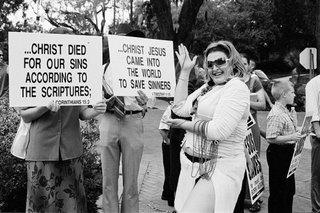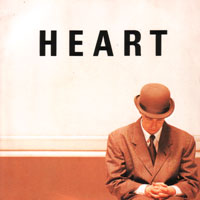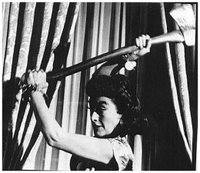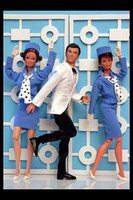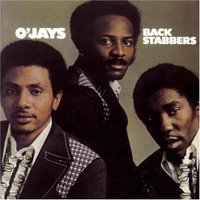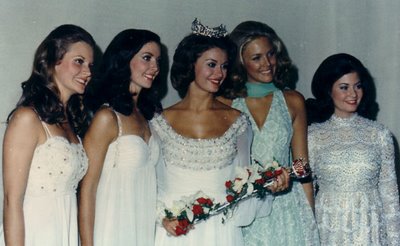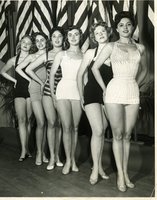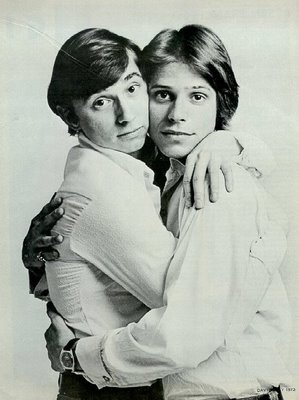
1. If a young man is promiscuous, we say he is sowing his oats; if a young woman is promiscuous, we say she is a slut; if a homosexual of any age if promiscuous, we say he is a neurotic example of low self-esteem.
3. A person who is promiscuous professionally is a prostitute. Most people who are promiscuous would be shocked if you called them a prostitute, however, because they do not think of themselves that way, simply because they do not charge money.
— Andrew Holleran, "Notes on Promiscuity"
La Vickstrix and Ms. Clinique crash landed on my garret last Saturday night for Cold City Pride, toting at least one roll-aboard and several discreet bags for one night’s stay (La Vicks brought her computer, under the silly misapprehension that she would actually get work done). Honey, what is a girl without her potions and lotions? We went out to a very civilised and expensive sushi dinner with La Nena, a friend and colleague of Mr. Gordo, who works at Cold City Museum. While she made eyes at some blond hunk-ette, the boys, er, girls, dived into the unagi like there was no tomorrow, a lesson learned from Mr. Gordo and his large family— you eat quick or you starve. Once, in Caracas at a family dinner, I watched in dismay as the fried plantain plate was passed in the wrong direction (e.g. not in my direction) and by the time it arrived chez Moi it was, needless to say, empty. La Nena may have missed out on the barbecued eel, but she made it up for it by eating Mr. Blond Hunk-ette— with her eyes! I preferred the unagi, personally.
44. The third law of promiscuous physics is: The thousandth trick is not what the first one was.
After dropping La Nena off chez Elle, we ventured downtown to the local Bear lair for their Pride party, which of course was a crush. Prancilla was there, as well as some students (!), a couple of staff from Cold City U., and other assorted gay varieties from the hinterlands and Cold City itself. The designated driver, I mostly observed as the queens paraded back and forth with beer bottles or cocktails, the music loud but nobody dancing. It wasn’t exactly a stand-and-model scene, but most people stuck to their tribes. Ms. Clinique’s eyes were wide with wonder, while me and La Vicks, definitely old hands, feigned interest. Once you’ve walked the gauntlet at the San Francisco’s famous Bear bar the Lone Star (aka the Loin Stare), this was small potatoes. But I think the spectacle of various genres of gay men prancing back and forth on this summer stock stage was too much for her, and Ms. Clinique soon claimed tiredness as she dragged us out of the bar and back into the car, for a midnight stop at my boutique supermarket for chocolate cake muffins, which we consumed upon returning to the garret, as La Vicks concocted a “whole milk” mix out of my 1% and half and half.
5. Promiscuity is thought of in two ways: as having many, many different partners; and as having no standards for the people with whom one sleeps. The second type is comparatively rare, however, and is held in contempt by the first. The worst thing we can say about someone is that he/she will sleep with anybody.
6. But the truth is that many of us will sleep with almost anybody.
Sunday dawned bright and early, especially considering the strange sleeping arrangements of fitting three queens into the garret. I still don’t know how La Vicks ended up on the bed, with Ms. Clinique in a sleeping bag on the floor and me crunched into my separate dressing room on a mattress pad on the floor, but these, as they say, are the mysteries of Divahood. We were scheduled for a brunch at the household of the ex of Zilla, the paramour of Prancilla, but when we rang them, showered and powdered, at the ungodly hour of 9:00 am, Prancilla was cleaning her house, ETA unknown, and we decided to go out for breaky on our own. After a decidedly wholesome (and whole wheat) meal at Upscale BoBo Diner, we were off to Pride!
Now, this was my first Cold City Pride, and while I tried to approach it with an open mind, my expectations were low. And they were met and in fact exceeded in the race to the bottom of the barrel of Prides I have been to, sad to say. At one point, I turned to La Vicks, as we sweated it out under the sun, and asked, “Where the hell are the drag queens?!?” The Dykes on Bikes were thrilling as usual, but after that, pish! Politicians shilling for votes, car dealerships, a company specialising in home renovation (good grief), banks, corporate sponsors, anemic floats for bars and clubs, and the ubiquitous HRC, marching down the street like Hitler Youth with white teeth and big, vacant smiles, waving huge equality flags and garnering almost as much applause as the various PFLAG contingents. I felt like a teenaged Cassandra in an afterschool special: No, girls, don’t applaud for their flags (and besides, my bumpersticker has faded all to shit; feeling ambivalence criticising HRC but having their damn [faded] sticker on my car)! No worries, I was handed another one by a smiling pod person. HRC: Crack for gay “assimilationists.”
Oh, sure, there was a small, pathetic leather contingent, and some genderqueer hippie youth, but the only absolutely fabulous things about the parade were a) the weather, and b) a campy gay cheerleading squad, which while they certainly couldn’t compete on ESPN, were at least dudes in skirts (and such cute skirts too). In response to my earlier query on the missing drags, La Vicks turned to me and said dryly, “Oh, this just reflects the modest and mainstream nature of this area.” Well, damn. I coulda had a V-8! Cold City Pride was as wholesome as a peanut butter and jelly sandwich on Wonder bread with a nice, tall, cold glass of milk.
9. Americans, products of a consumer society, with a short attention span, a bent for instant gratification, inculcated by advertising, and a fairly lonesome society, are made for promiscuity.
As the parade meandered by, long in the tooth, La Vicks and Ms. Clinique got the bright idea to go shopping, so we wandered through a big department store nearby where La Vicks bought a pair of cute sneakers and Ms. Clinique plunked down some major cash on a “sale” at Pink. I think she got, like, one shirt, a tie swatch, and a pair of cuff links for $200. I examined my cuticles (need work) and cursed sleeping on the floor and no longer being 22. Then we had a joyful rendezvous with Prancilla and Zilla at the festival, where Prancilla was clearly energised beyond reason, doing stripper dances while excitedly singing C + C Music Factory’s “Pride: A Deeper Love” as the rest of us slumped into our respective benches. I guess exercise does indeed give you more energy; I’ve read that. By the time La Vicks and Ms. Clinique packed up their goodies and decamped, I needed a nap. Pride, as they say, goeth before the fall, which in this case was back into my bed, smelling of La Vicks’s terribly expensive cologne. A promiscuity of the senses had me overwhelmed, as I swooned into the soft embrace of my IKEA sheets.
16. Before the plague, promiscuity was a growth industry.
17. Before the plague, promiscuity was the sore point of homosexual life. Why—even gay men wish to know—did homosexuals convert liberation into promiscuity?
18. No one knows.
Now that the confetti has been cleared, Cold City sanitation workers have removed the “Beer Garden” from the park, and the queens returned to their rural towns or suburban condos, I have been processing a bit about Pride, and catching up on my blogrolling, terribly neglected of late, where I discovered Centre of Gravitas had a round-up of Pride-themed blog entries (including, nicely enough, my own). Upon reading his links, and thinking of my own ambivalent feelings regarding the celebration in Cold City, I began to ponder some of the circular and seemingly endless debates regarding LGBT identity.
79. In youth, promiscuity bestows the rapture of poets and saints.
80. In old age, it means haunting the truckstops on I-75.
I wholeheartedly agree with CoG that Queer Pride still matters, but I’m not sure what that means exactly anymore. I personally identify with the queerer, sex radical elements of our community, with a certain aesthetic and sexual and cultural promiscuity, so to speak. This is at the same time that I have a somewhat quotidian image in my self-presentation: I am unpierced, untattooed, wear my hair in a short, masculine style, and generally wear similar or the same clothes most American men wear. In fact, I think I am probably a little boring visually: cute, maybe, but not Queer Eye for the Straight Guy. I am hesitant in this description due to the politics associated with “str8 acting, str8 appearing” in the gay men’s community. That is not what I want to reify here, but it gets to the crux of the matter: what is normal? What is queer about the Queer? Are we just like heterosexuals, or somehow essentially, elementally different? And more importantly, how do we measure this? Sexual practices? Sartorial choice? Personal politics? Economic activism? Place of domicile? Intellectual imagination?
This is, in many respects, a very tired debate, but one apparently we are unable to dispatch with a silver bullet or a wooden stake. This year’s spicy variant seems to be the Hedda Lettuce controversy at Boston Pride, which I stumbled upon at Pelican in her Piety while following CoG’s hyperlinks. I consumed the controversy like StarZilla needs a job. My first, visceral reaction was that the censuring of Lettuce was outrageous! I was truly, deeply upset, especially considering some of the reactions of Lettuce’s critics to the conundrum. It made me think that the imagined divide between sex radicals and mainstream LGBT folks was unbridgeable, a chasm of misunderstood concepts and mutual suspicion. Certainly, elements of l’affair Lettuce point us in that direction.
8. Sex is a pleasurable experience repeated many, many times during our lives that, if experienced with the same person each time, is considered responsible, adult, mature; if experienced with a different person each time, is considered promiscuous.
Yet, still, this binary is ultimately false. In truth, many if not most LGBT people bridge the divide in strange and idiosyncratic ways. I think for men in particular a lot of these questions, natürlich, revolve around sexuality, promiscuity, and HIV. In essence, and franchement, are you a slut? In this sense, Lesbian and Gay Liberation, in its radical sixties form, was meant to free us from the bonds of cultural notions of sexual purity and moral wholesomeness, the vicious dyads of virgin/whore, normal/abnormal. Lesbians and gay men of the 1970s worked, in remarkably different ways, to reimagine what constituted queer sexuality (although they didn’t necessarily use that term), rejecting conventionality and attempting to reconceive the universe of human relationships along a homophilic and homosocial trope.
24. People were promiscuous in the past for a simple reason: "Sexual practices are banal, impoverished, doomed to repetition," Roland Barthes said, "and this impoverishment is disproportionate to the wonder of the pleasure they afford."
For men, this meant the development of a sexual hedonism in the cities of the developed world fueled by urbanism, the gay ghetto, gay sensibilility, literature, travel, drugs, industry, and pornography. The radical political aims of this culture of sexual hedonism were muted for most participants (in favour of the corporeal), but remained alongside and embedded within the orgiastic, promiscuous dimensions of urban gay sexual life. Nowadays, of course, we associate this phenomenon almost exclusively with the HIV crisis, and the mass death of gay men in the eighties and nineties. Recently, I screened A Very Natural Thing (1974) for a course, one of the first normative representations of contemporary liberated gay men. My students could not remove the equation of seventies sexual hedonism from death via HIV disease, no matter how much I tried to get them to move their minds into the historical moment of the immediate post-Stonewall period. Not only was this an exhausting pedagogical exercise in frustration, but also spoke to the ways in which the gay men of today are themselves the battleground for the fear, loathing, and disgust that HIV triggers.
22. Men are now telling other men in the new cities they've moved to that they never were promiscuous.
23. (Gay men now suspect each other of promiscuity.)
Leaving aside the dismal fact that these feelings neatly dovetail with mainstream heteronormative discourses regarding deviant LGBT sexuality, what they offer us is exactly the complicated legacy we inherit, which is to suggest that the desire for normativity among certain segments of the LGBT community is both cover for the trauma of HIV and heteronormative violence, as well as perhaps an inchoate desire for a certain grounding in a chaotic social world of trauma, exclusion, and marginalisation.
I can understand these desires, and even reflect them in some ways, but where I become irritated is when they become hegemonic and totalising. To return to l’affair Lettuce, the fact that some LGBT people now consider Pride to be a "family-friendly" event (in the most reactionary, Disney sort of way) was profoundly depressing. Firstly, because I loathe the culture of protection that we as a society have embraced and impose over our children, which is both deeply patronising as well as historically and socially myopic. Secondly, and more to the point, this event purportedly honours revolution and resistance, not blandishments for corporate crumbs and smiling, happy, consuming (LGBT) families. Maybe we need to have a 'normative' Pride, say, maybe, on Labour Day weekend, which can be like Candy Land for grown-ups and children alike. Until that time, we will continue to struggle over the meaning of Pride, but when the drags, leather queens, and skirted male cheerleaders are banished, I’m outta there (having a V-8 instead, apparently).
65. Promiscuity fails to satisfy that most important need—for intimacy, rootedness, shelter.
66. Promiscuity supplies these in small, ecstatic doses.
This is most prominently because I believe in a catholic promiscuity of the world. As Prancilla and I have been quoting to each other the legendary Venus Xtravaganza whenever we were trying to figure out where to eat over the last week: “I’m Hungry!” And I am hungry, for sensuality, visual spectacle, aesthetic amusement, political engagement, human connection. In this sense, I inherit and honour the sexual and social promiscuity of my gay brothers of the current and past moment. This extravagance, this overload of sensuality in food, feeling, emotion, sensuality, and color (and yes, sex), has never sat well in our Protestant culture of ascetic denial. Or rather, more pointedly, it doesn’t fit within the appropriate parameters of socially accepted indulgence. Listen to some normative queens discuss their home renovation projects on Fire Island or upstate and wait for your head to explode. This is promiscuity, of capital, of money, of unnecessary things, but is has the moral approbation of society, so therefore is OK.
41. The average person thinks other people have sex with him because he is good-looking, sexy, special, attractive. In a promiscuous world, however, we are picked up mostly because we are breathing.
The simple fact of the matter is that I don’t want to be “normal,” and I don’t mean this in the annoying sort of youth culture of resistance way. I mean, having a chicken bone through your nose nowadays is practically normal, since you can get one at any suburban mall. What I mean is often I feel, because I am gay, because I am an intellectual, because I am contained within an indeterminate and misrecognised racial body, that I am, to put it mildly, a freak. In some ways, my sexuality has the least to do with these feelings of dislocation within mainstream culture, although like all social oddities, I am culturally bilingual out of necessity. Some of us just pass more easily than others.
39. Promiscuity offends that deep desire W.H. Auden said was not merely to be loved, but "to be loved alone."
This is reinforced by the fact that I have always been drawn to similar folk. Mr. Gordo? A poetic oddbin who walks into walls because he’s gazing at the clouds (dans les nuages literally), and has been known to shed tears over a good soup. The Fierceness? Her mind is driven by such a deep and powerful intellectualism it sets her apart from even other academics. The Voice? She listens to music I delicately would describe as “The Brian of HAL” and actually likes it. When I first saw my lesbian henchwomon Skanque Huore, it was my first month at Sadistic College and she was lumbering to class in a black suit with a pressed white shirt, a short haircut, and a countenance that screamed, “Hello, I am your lesbian caretaker for the evening.” She described her look at the time as being “portly gentleman.” I knew instantly she had to become my bestest friend, and in short order she did.
Perhaps incorrectly, I don’t consider these individual idiosyncrasies, like having a preference for Madras after Labour Day, but rather essential, innate differences that set people apart, that makes them keen observers of the society around them, that gives them a critical sensibility that is skeptical of platitudes and Horatio Alger, that seeks confrontation, that is curious, unsettled, roving, travelling. Does that mean, like Venus and Octavia in Paris is Burning, that I don’t also want the house with the picket fence, the Golden Retriever, the adopted baby, the washer and dryer set? Perhaps. But I want it on my terms, which does not mean constrained by the façade of respectability, per se. Viewers often cited the scene where Octavia and Venus speak of their desire for fame and domestic bliss as “sad,” but upon a recent viewing of the director’s commentary, Jennie Livingston addresses this by describing these desires as essentially American, and I think that indeed they are. What makes the scene sad for so many viewers is their inability to imagine these profits and gains of the American Dream accruing to two pre-Op transwomen of colour. And that is itself a sad commentary on how we imagine access to the common dreams of our society. Why the hell not, after all?
69. Promiscuity is the school of hard knocks, the parent that abuses all its children.
In some of the commentary around the recent gay bashing of Kevin Aviance, some gay people have implied that Aviance brought it upon himself by being so flamboyant, by being so gay, so out, so public. This week, IHE had a "Views" piece by a closeted gay man who revealed his sexuality in a campus interview and subsequently was “outed” publicly outside of the interview process, contra to institutional confidentiality guidelines. As I wrote in the commentary for the piece, the author’s contention struck me as problematic: what does it mean to come out but want to keep it a secret? Recently, on an online thread on Cold City Pride, I made some commentary on how boring the parade was and how it was reflective of the local politics of the community, using the acronym “LGBT.” Another gay man responded strongly to my use of the acronym, claiming he had nothing in common with “those freaks, fat bitches, and trannies.” Um, OK. These three threads of thoughts and commentary come together within the idea that if LGBT people act and behave “normally” and with discretion, then homophobia will disappear overnight and we can join the masses in the malls. But heteronormativity is an ideological system that does not rely on the referent, but on the sign as a whole. Therefore, the actual body of the LGBT person is indeed the battleground for these debates, but in an almost wholly abstract way. The figure of the LGBT person is more important than the sartorial choices of any given individual.
85. It is pointless to feel guilty about promiscuity, so long as you enjoy(ed) it, and harm(ed) no one. One may after all have brought joy into the lives of others and it was, let's face it, a great adventure.
Again, the repetitive circularity of these profoundly disturbing and misinformed opinions is depressing. This past week, alone and pondering these issues and a little depressed because Prancilla was on the east coast helping her mother move, playing dutiful daughter and subsequently unavailable for lackadaisical fun, I watched The Adventures of Priscilla, Queen of the Desert. I always like this film, but thought as well it was a little light. But it was just the ticket to resolve some of these issues in my mind, precisely because it is about a fantastical journey of two gay drag queens and one transsexual into the heart of l’Australie profonde, a confrontation with image and reality and danger and discovery. In the process they discover something about themselves and their place in society, as well as their clique as a community of sorts.
As Bernadette tells Felicia after he gets her ass kicked for being a drag, “It’s funny. We all sit around endlessly slagging off that vile stinkhole of a city (Sydney), but in some strange ways it protects us. I don’t know if that ugly wall of suburbia has been put there to stop them from getting in or us from getting out. C’mon … don’t let it drag you down. Let it toughen you up. I can only fight because I learned to.” Urbanism and the socio-cultural (as well as sexual) promiscuity it promotes has always been essential to modern homosexuality, the pollution of contact reinforcing communal LGBT identity and placing it in a context of cosmopolitan values, sophistication, ephemerality. Many of us still imagine ourselves within these values. However, increasingly, such as in Cold City, LGBT people have broached the wall, are living amongst heterosexualia. The gay ghetto of lore and loathing has, at least in Cold City, disappeared, as my Bear barber tells it, “when everyone moved to the suburbs.” And I personally miss that here, the gay supermarkets and kiosks and bars and hardware stores and cafes and juice joints, all bounded and identifiable and safe, if a somewhat illusory safeness.
62. Promiscuity is the last true adventure, the last ecstasy, the last rain forest of industrial-consumer man.
But for many other LGBT people, who cannot imagine, like their heterosexual counterparts, living within sight of their neighbors’ windows, such neighborhoods are repulsive. Following this, maybe the culture wars within the LGBT community are more akin to the general differences in taste culture, sensibility, and politics that affect and deform American quotidian life. In other words, this suggests that our differences are less about sartorial choice and sexual practice and self-presentation and more about the larger worldviews and perspectives that currently divide the American populace, less about sexual promiscuity and more about socio-cultural promiscuity, contact, pollution, connection. In other words, following Bernadette, how do some of us learn to fight (Which battles? Against which of the forces arrayed against us? Why do some of us have to fight more than others? How does this change our self-conceptions of socio-political standpoint?)? How does that affect where we find ourselves, as well as where we desire to be? Gay exceptionalism inspires many of us, but these debates reveal as well in many ways the very fact of LGBT banality. Too bad our vociferous and hate-mongering critics can't seem to swallow that jagged little pill. We ourselves, LGBT people both exceptional and banal, seem to have enough problems doing it ourselves.


